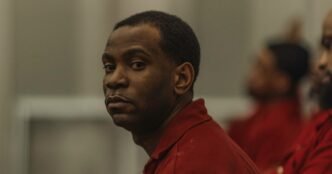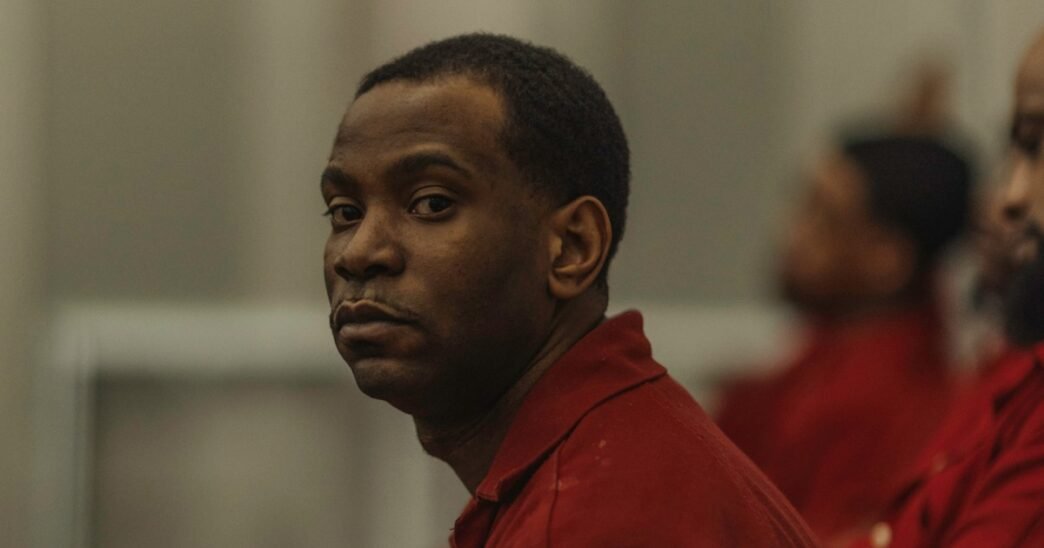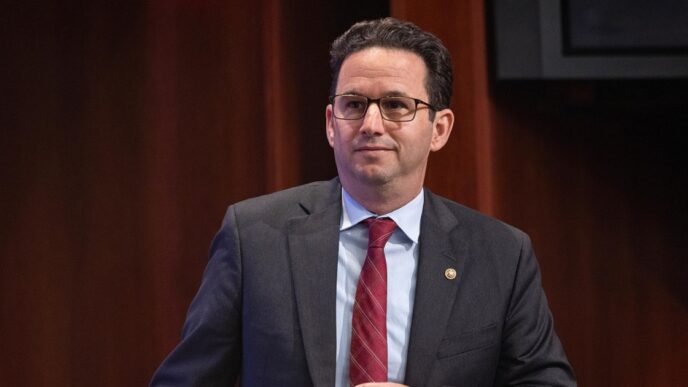He pulled over at Lamar and Adelle streets, then got out and ran. He didn’t get far before he was arrested.
Harris said she remembers Jordan telling her police lights were flashing behind them, but nothing more.
Both were taken to a hospital. Jordan was treated for cuts on his head and sent to Raymond Detention Center. In jail, he asked how Harris was doing, according to a recording obtained by NBC News. An investigator told him Harris was in surgery.
Jordan sobbed.
“I hope she’s all right,” he said, his voice cracking.
The officers, Jeffery Walker and Michael Rhinewalt, gave a very different version.
The pair told investigators that they had pulled the Rogue over for running a red light, and when Rhinewalt started to get out of the patrol car, the driver took off.
As they chased the car onto an interstate, “I heard what appeared to be a gunshot and a muzzle flash, and noticed that the back window shattered, so I immediately leaned over,” Rhinewalt told investigators, according to recordings from the case file. “I immediately returned fire.”
Walker said the SUV slowed down at one point in the chase, and someone inside fired again. “You could hear shots real loud at that time,” he said. Both officers shot at the Rogue.
Moments later, the officers said they saw objects tossed from the car.
Jordan eventually pulled over and took off running, and Walker opened fire again, later telling investigators he thought a black object in Jordan’s hand was a gun. It turned out to be a cellphone.
The investigation into the shooting happened on two tracks. In one, the Hinds County district attorney’s office gathered evidence to prosecute Jordan.
Walker testified at Jordan’s prelimin hearing, telling a judge that a neighborhood witness “confirmed that bags of dope and guns” were thrown from the Rogue and that three armed men took them.
The judge ruled the case against Jordan could proceed. He already had two unresolved felony charges stemming from a 2020 arrest when police say he stored stolen motorcycles at his mother’s house. State law prohibits bail for someone facing felony charges from an earlier arrest.
That meant he would wait in jail while the case moved forward.
The second track was run by the Mississippi Bureau of Investigation, or MBI, which is required to examine police shootings, and the state attorney general’s office, which determines whether the shootings are justified.
In interviews with MBI investigators during his first days in jail, Jordan at first seemed confused about the chase and how long he’d been locked up. He gave muddled or inconsistent recollections, including where he drove and whether he’d thrown anything out of the window, according to a review of the audio interviews and his statements.
Jordan sounded exhausted and on edge — but also eager to tell his side, even without a lawyer. He remained consistent on one point: He’d never had a gun.
During one interrogation, MBI Lt. Heath Farish repeatedly suggested Jordan had a weapon. At one point, he told Jordan that a witness had seen him toss a firearm from the car, in an apparent attempt to get him to confess to a weapon. (Farish could not be reached for comment.)
The only nonpolice witness interviewed by MBI had told another investigator that he did not see a gun, according to the case file.
Farish also threatened to use DNA to tie Jordan to a gun found at the scene. Evidence logs show that investigators found only a starter pistol, a type of firearm that fires blanks and is usually used to signal the start of a race. Investigators never determined its relevance to the case.
“Man, we can do whatever we gotta do,” Jordan told Farish. “And I guarantee you, when all this is over with, y’all are gonna say, ‘Damn, Mr. Jordan did not have a gun on him that night.’”
MBI investigators, two months after speaking to Jordan, interviewed Rhinewalt and Walker. Each had lawyers with them. These sessions were shorter, nonconfrontational and consistent.
The MBI additionally collected bullet fragments inside the Rogue and spent shell casings on the street. They found surveillance video and looked for the objects the officers had said were tossed out of the Rogue, but did not find them.
In November 2022, the MBI said the case file was ready for the attorney general’s office to review.
A decision didn’t come for another two years.
In Mississippi, criminal cases must go to trial no later than 270 days — about nine months — after a defendant is indicted and arraigned. But there is no limit to how long someone can wait to be indicted. In some parts of the state, including Hinds County, there aren’t enough judges or prosecutors to keep up with cases, and there is still a pandemic backlog. Overwhelmed and underpaid public defenders do not have enough time to properly represent all their clients, who tend to be of limited means.
In early 2022, researchers at the MacArthur Justice Center, a nonprofit that advocates for those caught up in the criminal justice system, reported that more than 700 people were held in Mississippi jails more than a year, including 96 in Hinds County.
Jordan joined that group. He was arraigned in April 2023 and pleaded not guilty. A couple months later, his court-appointed public defender asked the judge for copies of the evidence against him, and for a speedy trial.
Then nothing much happened. A new public defender took over Jordan’s case later in 2023, but made no motions on Jordan’s behalf until August 2024, when he asked the judge to delay the trial because all the evidence still had not been turned over by the district attorney’s office. The judge agreed.
In early 2023, I wrote to Jordan asking for his perspective on the shooting. He sent back a handwritten note. “I’m still sitting in jail no court date,” he wrote.
He started calling me on the jail’s phone line through an account paid for by NBC News. We spoke every few weeks, short conversations that often covered the same ground: I’d ask what was new in his case; he’d say he didn’t know. He’d say how badly he wanted to go home.













